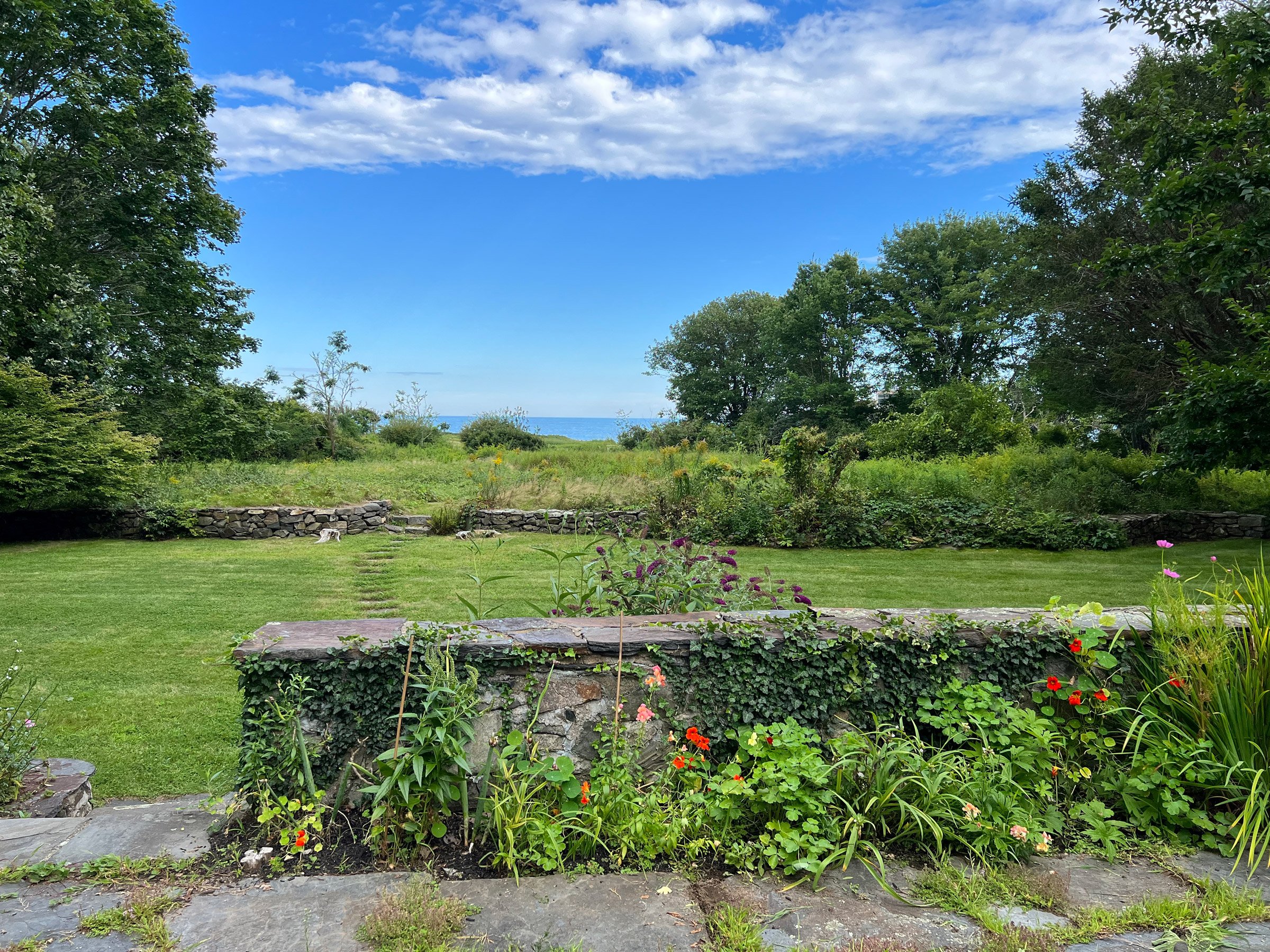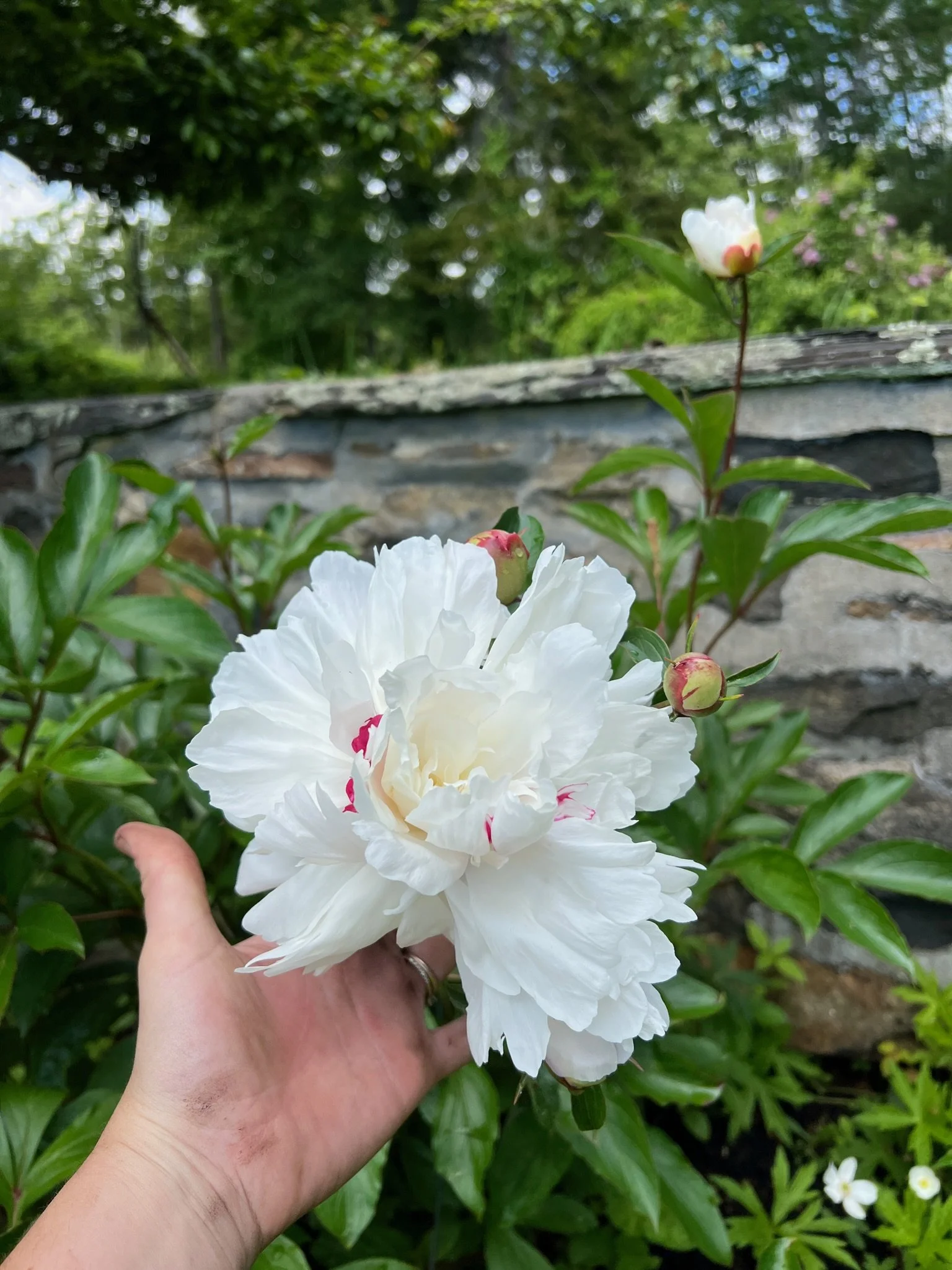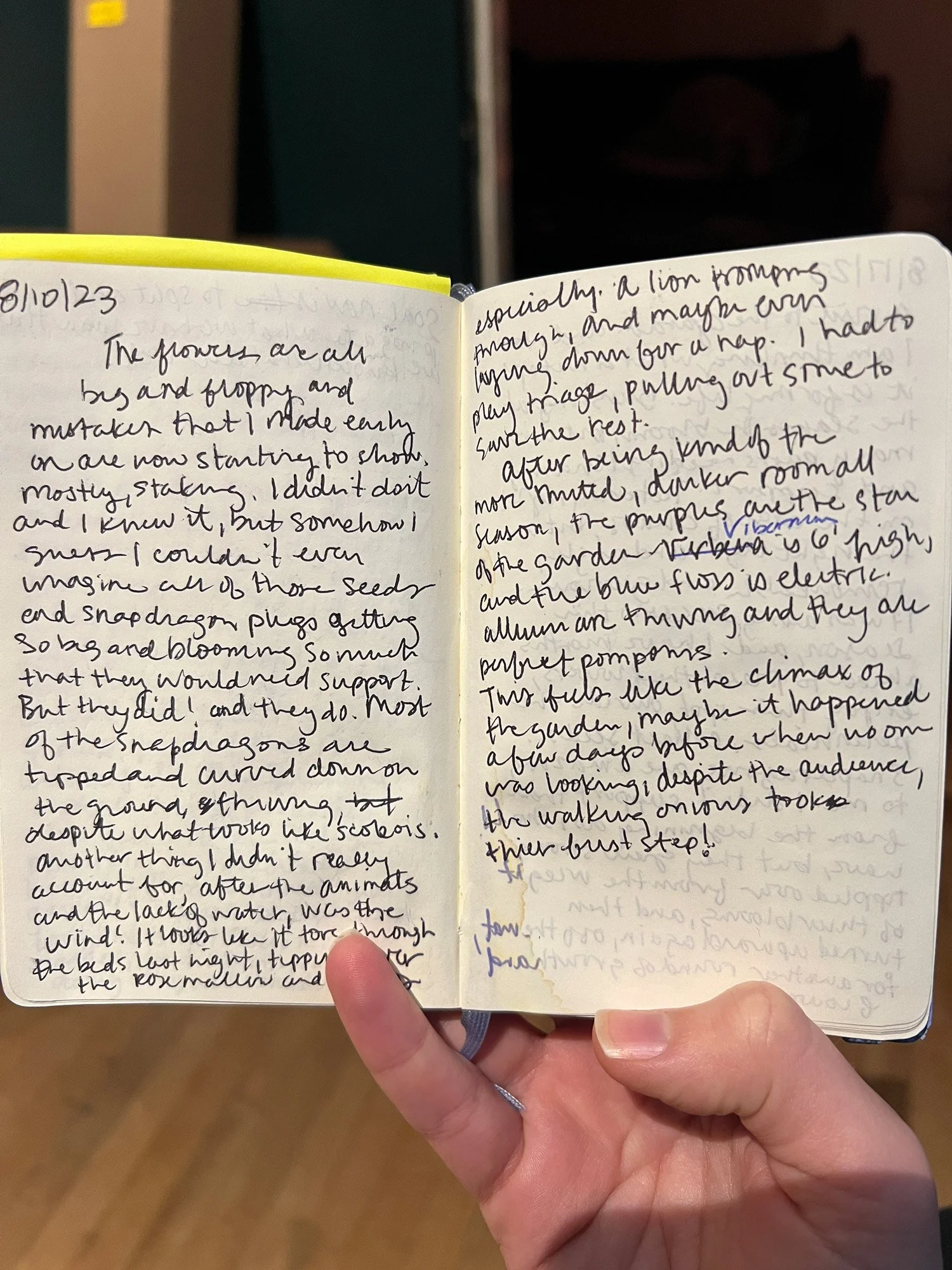Wild Knoll Garden

View from Wild Knoll
May Sarton was a writer and avid gardener who rented a house called Wild Knoll from Mary-Leigh Smart and Beverly Hallam from 1973-1995. Sarton could be considered the first artist in residence at Surf Point, alongside Beverly Hallam, whose studio was in Surf Point.
Beginning in 2021, visual artist Carly Glovinski, in collaboration with author and regenerative farmer, Acadia Tucker, re-established the existing terrace gardens using May Sarton’s book “The House By the Sea” as a guide. They also built a new garden space laid out according to the architectural drawings of the former house on the site. Low garden beds corresponding to the layout of the first floor of the house were constructed out of 2x4s, the same material used to build the walls of a house. Each former room of the house has a different color theme. Plant species for each of the color themed rooms were selected based on hardiness and drought resistance, natural animal resistance, and bloom times.
The restored gardens and new “rooms of flowers” on the old foundation are a place for residents and the public (by request) to enjoy. They are also symbolic of what Surf Point is: a support system for artists, a meditative space to let ideas bloom, and an immersion in nature and the creative process.
Part environmental artwork, part community and historically engaged work, this project is a conversation, a negotiation, an honoring of a particular place- its future, and its history. It is a meditation on human connection to nature, and a commentary on time, care, and persistence for an artist and nature itself.
In 2023, Master Gardener Elizabeth Brown of Foxglove Farmhouse joined the collaboration to assist with tending the garden, ongoing consultation, and the development of a seed collection to accompany the project.
During the first 3 years of the project, Carly and collaborators journal and photograph their observations of the site and experiences tending the garden. This documentation will be be turned into a small book to accompany the project in 2024-2025, nearly 50 years after Sarton’s The House By the Sea was published.
In 2024, Carly will work with Surf Point to enable the of “activation” of the site, where the planted space becomes fertile ground for collaboration with invited writers, artists, and choreographers, providing a “stage” for response across other creative disciplines- highlighting the inseparability of the natural and the social- and the relationship between environment and community. More public programming will be announced soon!
“Making living work that is shaped by its environment and ecosystem, and continually activated and tended by eco-minded creatives is a negotiation, an honoring, and an ever-evolving conversation. It brings in Mother Nature as a direct collaborator and primary maker. Together, we are both shapers of place. This way of working depends on constant tending, collaborative effort, and community in ways that are very different than my established studio practice and has seeded many new tendrils of interest for me. Through collaboration with regenerative farmers, writers, and flower farmers at the early stages of this work, I’ve uncovered a wealth of new knowledge, creative ideas, and a network of people that are very interested in this kind of merger of environmental and artistic fields.”
Map of Wild Knoll Foundation Garden.
Make a donation.
Whatever it is, your support for Wild Knoll Garden helps us grow.
About the Artists
Carly Glovinski
Carly Glovinski makes work that explores the make-do, resourceful attitudes associated with domestic craft and a reverence for nature and the great outdoors. The elements of time and place are embedded in her work, measured by tides and seasonal flower blooms, and marked by labor and repetitive process. She received her BFA from Boston University and is represented by Morgan Lehman Gallery in New York. She has been awarded residencies at Surf Point Foundation in 2021, and the Canterbury Shaker Village in 2020, and grants from the New Hampshire Charitable Foundation, the Berkshire Taconic Community Foundation, and the Blanche Colman Trust. Her work has been in major publications such as New American Paintings, ArtMaze Magazine, Hyperallergic, and Vice, and is held in collections including Colby Museum of Art, Fidelity Investments, and the Cleveland Clinic.
Elizabeth Brown
Elizabeth Brown is the owner of Foxglove Farmhouse, a cut flower garden near the tidal York River. She is a graduate of the Gardeners' Workshop Farmer Flower School, a certified therapeutic horticulturist, and a Maine Master Gardener. A lifelong York resident, Elizabeth had the pleasure of growing up down the road from Surf Point Foundation, and counts the magic of her childhood, spent wandering the woods and rocky shoreline, as the foundation for her interest in growing flowers for her community.
Acadia Tucker
Acadia Tucker is a regenerative farmer, climate activist, and author. Her books are a call to action to citizen gardeners everywhere, and lay the groundwork for planting an organic, regenerative garden. For her, this is gardening as if our future depends on it. Before becoming an author, Acadia started a four-season organic market garden in Washington State inspired by farming pioneers Eliot Coleman and Jean-Martin Fortier. While managing the farm, Acadia grew 200 different food crops before heading back to school at the University of British Columbia to complete a Masters in Land and Water Systems. She is the author of Growing Perennial Foods: A field guide to raising resilient herbs, fruits, & vegetables , Growing Good Food: A citizen’s guide to backyard carbon farming, and Tiny Victory Gardens: Growing Food without a yard. Acadia is an Ambassador for regenerative agriculture for The Rodale Institute. She lives in Jonesport, ME.
Visit Wild Knoll
The Wild Knoll Foundation Garden is open to the public by appointment. Please complete the form below, and we will arrange a time for you to stop by. Please note, in most cases, we need at least 72-hours’ notice before your requested visit time.




















